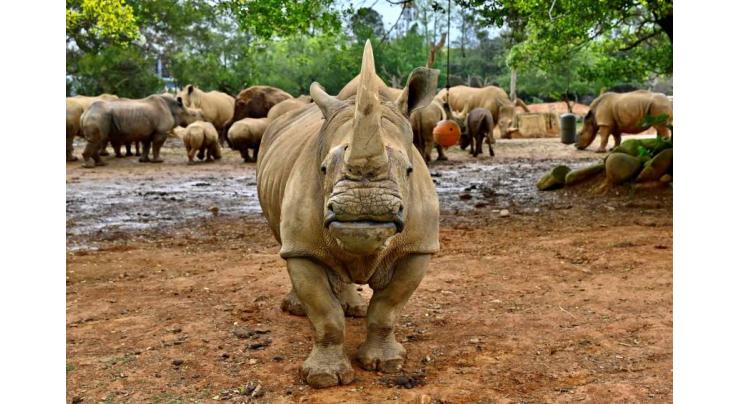
Japan Zoo Prays For Rhino Love As New Resident Settles In
Sumaira FH Published June 11, 2021 | 04:29 PM

Japanese zookeepers are praying that a newly arrived white rhino will hit it off with her blind date when they meet later this year as "Emma" settles in to her new home near Tokyo
Miyashiro (APP - UrduPoint / Pakistan Point News - 11th Jun, 2021 ) :Japanese zookeepers are praying that a newly arrived white rhino will hit it off with her blind date when they meet later this year as "Emma" settles in to her new home near Tokyo.
The horned herbivore, hand-picked by Taiwan's Leofoo Safari Park to start a family abroad, arrived in Japan this week, months later than planned due to pandemic complications.
Yasushiro Shimo, zoo division manager at Tobu Zoo in Saitama outside Tokyo, said the mild-mannered five-year-old would be introduced to her first suitor in September -- but a love match is far from guaranteed.
"The male is 10 years old, and is big. We will put them together and let them get acquainted. We think breeding will take a year," he told AFP.
"Of course, if they are not compatible, they won't breed. All we can do is pray." On Friday, Emma could be seen relaxing after her travels, eating, napping and wandering around her paddock.
She was picked from a herd of 23 rhinos because of her even temper and small size, which made her easier to ship overseas.
When her departure was delayed from March by the virus, keepers started teaching her Japanese words such as "come" and "no" to get her ready for the trip.
"Emma is very used to people. In Taiwan, the keepers put mud on her body and cared for her in other ways like that, so she's familiar with humans. In general, she's quite calm," Shimo said.
She is likely to double in size from her current slender 800 kilograms, he added. "She's still young. I think she will grow to two tonnes."Zoo breeding programmes have played a key role in repopulating herds of southern white rhinos, which are not in fact white.
The species currently numbers around 19,000, found in the wild across southern Africa, according to the conservation group Save the Rhino.
Recent Stories

Mired in crisis, Boeing reports another loss

Session Awarding Ceremony 2024 held at Cadet College Muzaffarabad

Austrian ski great Hirscher to make comeback under Dutch flag

Pakistan, Japan agrees to convene 'Economic Policy Dialogue'

FM Dar conveys deepest sympathy on torrential rains devastation in UAE

Spain PM Sanchez says weighing resignation after wife's graft probe

Tennis: ATP/WTA Madrid Open results - 1st update

Long-lost Klimt portrait auctioned off for 30 mn euros

Osaka seals first win on clay since 2022 in Madrid

Earthquake jolts Karachi

Sindh minister orders operation after attack on police in Ghotki

TikTok to fight US ban law in courts
More Stories From World
-

Spain PM Sanchez says weighing resignation after wife's graft probe
37 minutes ago -

Long-lost Klimt portrait auctioned off for 30 mn euros
37 minutes ago -

TikTok to fight US ban law in courts
54 minutes ago -

Anger among Ukrainians in Poland as Kyiv halts passport renewals
54 minutes ago -

Teenage girl arrested after stabbing at Welsh school
1 hour ago -

Pakistan Day Reception in Pakistan Embassy Abu Dhabi
2 hours ago
-

Russia, Ukraine to exchange displaced children after rare talks
2 hours ago -

Vaccines saved at least 154 million lives in 50 years: WHO
2 hours ago -

EU parliament's youngest lawmaker eyes re-election
3 hours ago -

10 dead as floods wreak havoc in Kenyan capital
3 hours ago -

UAE announces $544 million for repairs after record rains
4 hours ago -

Hamas releases video of Israeli-American hostage held in Gaza
4 hours ago











